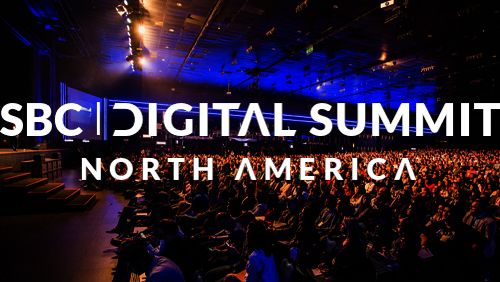
The second day of the SBC Digital Summit North America brought a whole new day packed full of expert speakers and timely information for its attendees. With sports hoping to start back up again soon, the day began with akeynote address looking at the evolving moment in sports betting with Zach Leonsis, SVP Strategic Initiatives at Monumental Sports Entertainment.
Leonsis quickly credited the operators of the U.S. market for the fantastic job they are doing rolling out sports betting over the past few years. “They take the regulations incredibly seriously,” he said. “They’re leveraging big data, they lockout problem gamers, they’re trying to encourage responsible gaming opportunities. But they’re also driving incredible fan engagement which drives ratings, which helps out team brands and league brands alike.”
Monumental is involved with William Hill’s push to have an in-arena sports book in Washington D.C., and Leonsis was happy to talk about it. “We have a unique opportunity,” he said. “Typically, sportsbooks are housed within casino properties and casinos aren’t legal in Washington DC. They are in Maryland and you can drive 30 minutes across the state line to MGM National Harbor for example.”
He expects the business will thrive year-round once this pandemic is over. “We envision one day, post-pandemic of course, when you can get several thousand people in to watch an NFL Sunday together or a Saturday morning Premier League match or a big pay-per-view boxing or UFC event and enjoy putting 20 bucks down on the match and enjoying dinner and beers with a few friends. There’s something very special about the energy of a crowd and being together,” he said.
The focus stayed on sports with the panel on ‘Time to Shine? The New Sporting Outlook.’ While Leonsis was firmly looking ahead in his keynote, this panel looked at the current challenges of a world with less sports. Moderator Dustin Gouker, Head of Content at Catena Media, was joined by Paris Smith, CEO of Pinnacle, Bryan Bennett, COO of Betfred USA Sports, Edward Moed, CEO of HPL Digital Sports and Simon Trim, CEO of Sporting Solutions.
Smith noted, as many have, that esports has grown over the past few months, but it was interesting to hear the challenges Table Tennis’ explosion brought with it. “It was so labor intensive, which made it possible to offer a market on that.”
She was also hopeful that esports will show some staying power. “I think that it’s going to gain a lot more openings in places like Las Vegas, maybe New Jersey,” she said.
Bennet bemoaned a lack of better regulations for esports in the American space. “I really had high hopes for esports,” he said. “In the U.S. it really hasn’t taken off yet, and I think that there are a number of reasons for that. Our U.K. division does a fair bit of business on esports and virtual racing. From the U.S. state-by-state regulatory perspective, most state regulators consider esports to be machine gaming.”
Gouker noted that there were simply lost opportunities going into this pandemic. “I think everyone would agree that virtuals would have done really well over here in the US if they had been adapted and gone live here a little earlier – but hopefully we’re going to have real sports back here soon.”
Trim warned that the esports space might be too difficult for most sportsbooks to offer, and requires talented traders. “esports is much harder to make money on than other sports out there.”
Later in the day, the focus turned to ‘Assessing the Payments Infrastructure.’ The panel was moderated by Jonathan Michaels, VP of Strategic Alliances at the American Gaming Association (AGA). He was joined by Behman Dayanim, Partner at Paul Hastings LLC, Mandi Hart, SVP of Client Success at Sightline, and Rick Arpin, Managing Partner at KPMG Las Vegas.
With Michaels noting that 41% of people prioritize safety with their payment options, Dayanim noted this will carry over to how operators use player data as well. “With whom will that data be shared?” he asked. “Aside from the casino operator, will the payment provider have the right to use the data in any way? That’s a question that comes up at times, as well as identity verification and money laundering.”
Michaels then asked about the evolution of cashless payments for casinos, something Nevada is now pushing for. Hart observed that the shift is “well timed with COVID and with the increased need for contactless payments.” But she warned:
“Consumers still see that environment differently, we have to educate people on these services and their capabilities. But also what’s important about it is making them comfortable. That’s the whole premise behind security elements, privacy elements, and all of the concerns for potential barriers that may come with them, and [it’s important] to work through those.”
Arpin added that the online space is at its own precipice, and may have to shift to more frictionless transaction methods very soon.
Today the SBC Digital Summit North America moves into its third and final day. But you can still register and take advantage of all the recorded presentations and get some last minute chances at networking by visiting their official website.